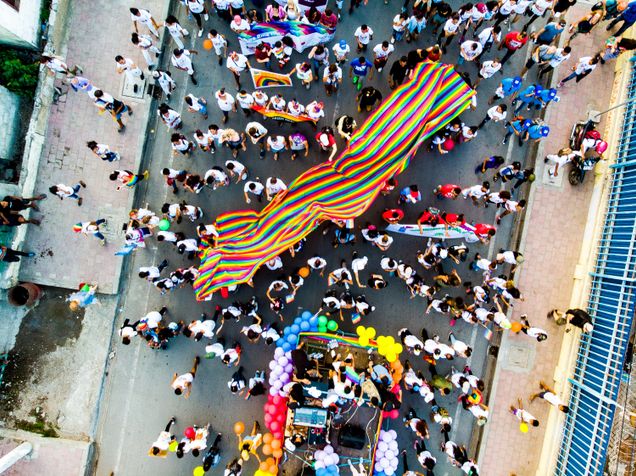Seminar Summary – Queering Repression: How the Global Crackdown on Civil Society Affects LGBT+ NGO Foundings

On February 26, 2025, the Spring 2025 Human Capital Initiative (HCI) Seminar Series at the Boston University Global Development Policy Center hosted Kristopher Velasco, Assistant Professor of Sociology at Princeton University, to share his work “Queering Repression: How the Global Crackdown on Civil Society Affects LGBT+ NGO Foundings.” Velasco’s research explores how foundings of LGBT+ non-governmental organizations (NGOs) have been impacted by policies enacted to repress LGBT+ advocacy and support activities as well as civil society more broadly. These NGOs are associated with improving many outcomes, such as support for minority populations worldwide.
Velasco began with an overview of the changing role of NGOs over the 20th century, in which there was a significant uptick in international NGO foundings beginning in the 1980s. He described the numerous political, economic, cultural and normative theories as to why this might have occurred, and highlighted that this growth coincided with increasing state restrictions on NGO scope and activities. As previous authors had noted, NGOs could be perceived as a potential threat to the security and sovereignty of a regime and considered “vehicles of foreign interference” due to their international funding landscapes.
Much of the work done by NGOs, especially within the LGBT+ field, is imperative to boosting community and individual autonomy, health and flourishing. One would assume that these restrictive NGO policies would lead to limitations in NGO activities, more NGO closures, and ultimately, reductions in voluntary aid, positive health outcomes, and human rights and well-being more generally. In the context of LGBT+ advocacy and support NGOs, Velasco focused his research question to answer: do anti-NGO policies have a negative effect on LGBT+ NGO foundings?
Velasco pulled information on LGBT+ NGO foundings from an original database of roughly 10,000 organizations across 172 countries between 2000 and 2017. He used quasi-Poisson models with two-way fixed effects in his analysis. Surprisingly, his results showed that there was no clear association between NGO foundings and anti-LGBT+ policies globally. Velasco also tested a “synthetic control” using the extreme case of Nigeria’s LGBT+ NGO ban and still did not find sufficient evidence of a negative effect of this policy on NGO foundings. However, a stratified analysis of LGBT+ NGO subgroups (health and development, nondescript and explicit LBGT+) showed that while health and development and nondescript NGOs did decrease foundings following anti-LBGT+ policies, there was an increase in explicit LGBT+ organizations. His research included qualitative interviews with LGBT+ NGO leaders in Singapore and Ghana to understand the mechanisms of why there was heterogeneity in the effects on foundings by subgroup, whether more generally anti-NGO, such as in the case of Singapore, or explicitly anti-LGBT+, as in the case of Ghana. He posited that this could be due to counter-mobilization as citizens felt these policies infringed on their democratic rights, as well as avoidance of state institutionalization – not being formally registered allowed these organizations to exist outside of the state’s reach and suppression.
Audience members had questions regarding both the data used in the study, as well as the results and its implications. Velasco expanded on the types of anti-NGO policies to which organizations are typically subjected, including restrictions on registration, foreign funding and public activities including protests. Another participant pointed out the regional differences in LGBT+ NGO foundings, with Latin America having consistently much fewer anti-LGBT+ policies than all other regions. Velasco explained that Latin America has strong legal protections for human rights more generally, supporting LGBT+ rights as well.
This research raises critical questions about civil society growth, LGBT+ services protections and the methods of institutional survival used by LGBT+ NGOs globally. Moving forward, Velasco’s project aims to explore whether the impacts of anti-LGBT+ policies are being felt within other aspects of NGO operations, such as funding and activities, rather than foundings. He also is interested in why there has been a decline in LGBT+ NGOs more recently, and whether this can be attributed to economic forces, a change in demand or normative shifts in pro-NGO sentiment. This work is important within the context of ongoing threats to liberalism and democracy, emphasizing the crucial role of civil society actors in supporting communities globally.
*
Never miss an update: Subscribe to the Human Capital Initiative newsletter.